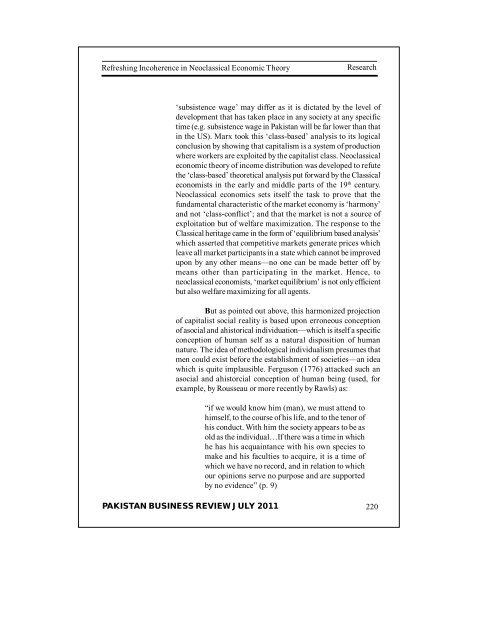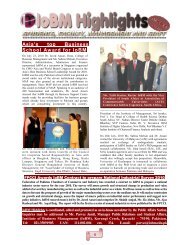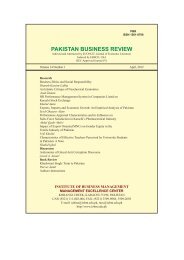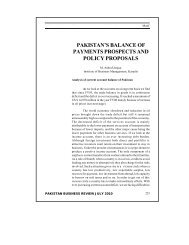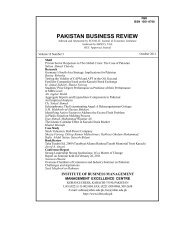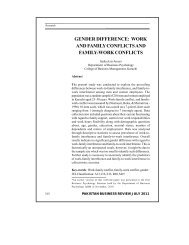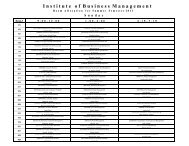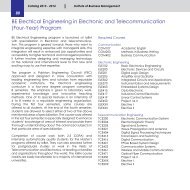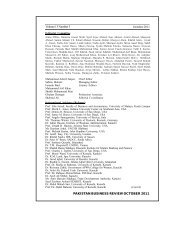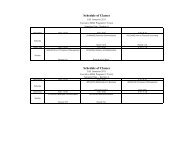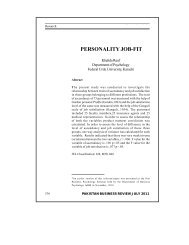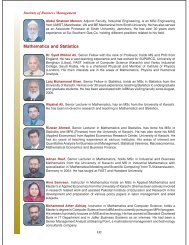PAKISTAN BUSINESS REVIEW - Institute of Business Management
PAKISTAN BUSINESS REVIEW - Institute of Business Management
PAKISTAN BUSINESS REVIEW - Institute of Business Management
You also want an ePaper? Increase the reach of your titles
YUMPU automatically turns print PDFs into web optimized ePapers that Google loves.
Refreshing Incoherence in Neoclassical Economic Theory<br />
Research<br />
‘subsistence wage’ may differ as it is dictated by the level <strong>of</strong><br />
development that has taken place in any society at any specific<br />
time (e.g. subsistence wage in Pakistan will be far lower than that<br />
in the US). Marx took this ‘class-based’ analysis to its logical<br />
conclusion by showing that capitalism is a system <strong>of</strong> production<br />
where workers are exploited by the capitalist class. Neoclassical<br />
economic theory <strong>of</strong> income distribution was developed to refute<br />
the ‘class-based’ theoretical analysis put forward by the Classical<br />
economists in the early and middle parts <strong>of</strong> the 19 th century.<br />
Neoclassical economics sets itself the task to prove that the<br />
fundamental characteristic <strong>of</strong> the market economy is ‘harmony’<br />
and not ‘class-conflict’; and that the market is not a source <strong>of</strong><br />
exploitation but <strong>of</strong> welfare maximization. The response to the<br />
Classical heritage came in the form <strong>of</strong> ‘equilibrium based analysis’<br />
which asserted that competitive markets generate prices which<br />
leave all market participants in a state which cannot be improved<br />
upon by any other means—no one can be made better <strong>of</strong>f by<br />
means other than participating in the market. Hence, to<br />
neoclassical economists, ‘market equilibrium’ is not only efficient<br />
but also welfare maximizing for all agents.<br />
But as pointed out above, this harmonized projection<br />
<strong>of</strong> capitalist social reality is based upon erroneous conception<br />
<strong>of</strong> asocial and ahistorical individuation—which is itself a specific<br />
conception <strong>of</strong> human self as a natural disposition <strong>of</strong> human<br />
nature. The idea <strong>of</strong> methodological individualism presumes that<br />
men could exist before the establishment <strong>of</strong> societies—an idea<br />
which is quite implausible. Ferguson (1776) attacked such an<br />
asocial and ahistorcial conception <strong>of</strong> human being (used, for<br />
example, by Rousseau or more recently by Rawls) as:<br />
“if we would know him (man), we must attend to<br />
himself, to the course <strong>of</strong> his life, and to the tenor <strong>of</strong><br />
his conduct. With him the society appears to be as<br />
old as the individual…If there was a time in which<br />
he has his acquaintance with his own species to<br />
make and his faculties to acquire, it is a time <strong>of</strong><br />
which we have no record, and in relation to which<br />
our opinions serve no purpose and are supported<br />
by no evidence” (p. 9)<br />
<strong>PAKISTAN</strong> <strong>BUSINESS</strong> <strong>REVIEW</strong> JULY 2011<br />
220


